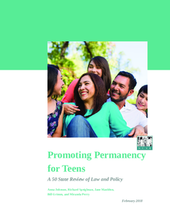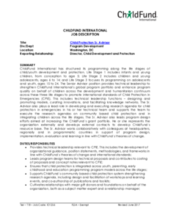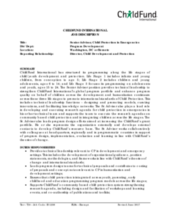Displaying 1451 - 1460 of 2221
This paper explores the diversity of U.S. state policies and practices for teens in foster care in two potentially competing areas: teens’ need for a permanent connection to a family (either their birth family, or an adoptive or guardian family), and teens’ developmental and practical needs in transitioning to legal adulthood, independence, and self-sufficiency.
This issue brief highlights the importance of understanding the concerns and needs of children and families in rural communities in the United States
This study explored whether the strength of caseworkers' engagement with families in the child-welfare system was associated with the caseworkers' academic degrees, job responsibilities and environments, and/or ethnicity.
This brief documents the evaluation of an online training for Citizen Review Panel (CRP) members in one southeastern state in the United States.
This study uses a large administrative dataset, the Adoption and Foster Care Analysis and Reporting System (AFCARS), to explore how public child welfare agencies in the United States use parental disability in their data collection efforts through examining the use of parental disability as a removal reason.
This study examined two research questions: (1) how do foster care alumni remember their experiences of placement moves in foster care, and (2) how do foster care alumni perceive the consequences of their foster care placement moves on their lives today?
From ethnographic research with unaccompanied children in the United States and Guatemala, this paper explores emergent and, at times, conflicting narratives of care that young migrants encounter while in U.S. federal custody.
The Senior Advisor position provides technical leadership to strengthen ChildFund International’s global program portfolio and enhance program quality on behalf of children across the development and humanitarian continuum across these three life stages to promote international standards of Child Protection in Emergencies (CPiE).
ChildFund International is seeking a Senior Advisor of Child Protection.
In this review, the authors briefly outline who is most at risk for experiencing parental incarceration, before providing an overview of recent multidisciplinary research on the impacts of parental incarceration for American children, ages 0–17.




